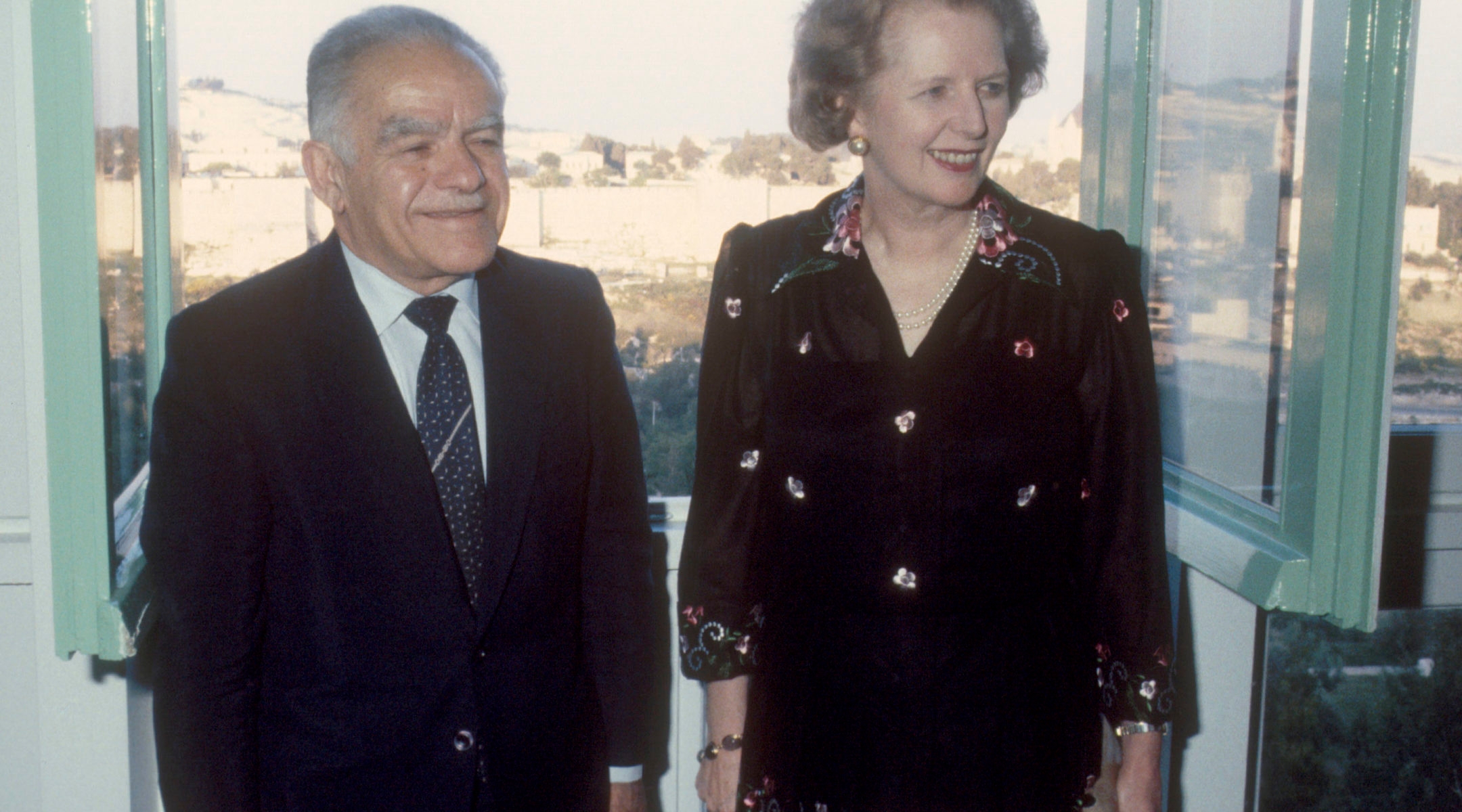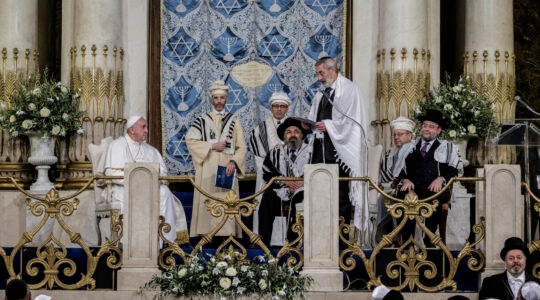Getting your Trinity Audio player ready...
Yitzhak Shamir, the seventh Prime Minister of Israel, passed away June 30, 2012 at the age of 96. Below is a brief biographical timeline featuring relevant articles from JTA Jewish Daily Bulletin reports, pieced together from items mentioned in various obituaries:
- Oct. 22, 1915: Born Icchak Jaziernicki in Ruzinov, Poland. (alternate sp. Yezternitsky)
- 1935: Yezternitsky leaves Warsaw, where he was studying law, to move to Palestine. Continues study at Hebrew University. (In November 1935, reports of agitation emerged from Warsaw University.
- 1937: Yezternitsky joins Irgun Tzvai Leumi.
- 1942: Avraham Stern, leader of Stern gang, is assassinated by British. Yezternitsky becomes one of a triumverate to fill the leadership void in the group.
- July 1946: Following the bombing of the King David Hotel, Yezternitsky is arrested by British during mass searches for Stern Gang and Irgun members and identified as one of 35 ‘extremely important’ members of said groups. Menachem Begin was identified by the British as a prime target in these raids.
[[READMORE]]
- 1955: Shamir Joins Mossad.
- 1961-1964: Involved in Operation Damocles, targeting German scientists engineering rockets for Egypt.
- 1970: Joins Herut Party, led by Begin
- 1973: Elected to 8th Knesset, sworn in in January.
- 1975: Elected Chairman of the Herut Executive, becomes party’s number two man.
- June 1975: Shamir present when Israel releases 20 convicted terrorists in exchange for the bodies of two Stern gang members. The two were hanged on March 23, 1945 for the murder of Lord Moyne, British Resident Minister in the Middle East
- 1977: Elected Speaker of the Knesset.
- 1979: Moshe Dayan resigns from the Cabinet; Shamir replaces him as Foreign Minister.
- 1980: Uzi Benziman profiles Shamir for JTA. A month later, Shamir is sworn in as Foreign Minister.
- 1981: Foreign Minister Shamir warns that U.S. weapons sales to Saudi Arabia could ‘cloud’ U.S.-Israel relations
- December 1981: Shamir says Egypt has no basis for complaining about the Golan Law
- April 1982: Following murder of an Israeli diplomat in Paris, Shamir warns, “we will use our force to crush these terrorist organizations, their leaders, their centers and their bases everywhere our long arm reaches. We will hit them without mercy because we have decided to live.”
- February 1983: Following Lebanon War, Kahan Commission report is released, saying Shamir “erred in not taking any measures” to help prevent the massacres at Sabra and Shatila.
- 1983: Gil Sedan profiles Shamir for JTA.
- 1983: Begin resigns as PM; Shamir assumes premiership.
- 1983: Shortly after the swearing in of his cabinet, Shamir is thrust into national economic crisis, implements austerity measures
- December 1983: On 40th anniversary of Irgun’s declaration of rebellion, PM Shamir says that peace on Israel’s borders would be assured by a renewal of the old underground fighting spirit.
- January 1984: Shamir meeting with Israeli-Arabs is first of its kind held by a Likud leader.
- September 1984: As part of PM Shimon Peres’s new coalition government deal, Shamir is tapped for role of premier in second half of government’s tenure.
- September 1985: Shamir denounces AJCongress mission to Cairo and Amman, Bronfman mission to Moscow
- April 1986: Addressing Irgun veterans, Foreign Minister Shamir declares Hebron a “liberated” Jewish city that “will never be given back.”
- March 1988: Shamir warns American Jewish leaders on a mission to Israel that criticism by diaspora Jewish organizations of Israeli policies “does much more harm than any…violent demonstrations in Gaza and elsewhere.”
- June 1988: With guarded optimism towards the U.S.S.R.’s diplomatic overtures offering to restore diplomatic relations with Israel for the first time since 1967, Shamir meets with Soviet Foreign Minister.
- September 1988: A former Stern Gang member confesses to 1948 assassination of Swedish U.N. mediator Count Folke Bernadotte but says Shamir was not one of the four men involved. Sweden demands a renewed apology, but Israel refuses.
- November 1988: PM Shamir butts heads with American Jewish leaders, refuses to take ‘Who is a Jew’ question off the national agenda.
- 1991: After a warm send-off to the Reagan administration in 1989, Shamir has a harder time warming up to President Bush and Secretary of State James Baker leading up to his first official visit. The Gulf War marks the first time in history that a foreign military (the U.S.) would land on Israeli soil to partake in its defense, putting Shamir on the defensive. Shamir’s policy of restraint in the face of Iraqi SCUD missiles is welcomed by the U.S., but angrily rejected by others in Israel, including Ariel Sharon.
- June 1991: One month after Operation Solomon, Jewish Agency chairman Simcha Dinitz discloses that PM Shamir decided to leave 3,000 Falash Mura converts behind in Addis Ababa.
- June 1992: After Labor party upsets Likud in Israel’s elections, Shamir steps down, announcing, “”I am at the end of the road.”
- 1998: Shamir and Peres call on lawmakers to repeal a law that created a direct election of prime minister separate from the Knesset.
- July 29, 2011: Shamir’s wife, Shulamit, dies at age 88.
- June 30, 2012: Shamir dies at age 96, after living with Alzheimer’s disease for six years.
Keep Jewish Stories in Focus.
JTA has documented Jewish history in real-time for over a century. Keep our journalism strong by joining us in supporting independent, award-winning reporting.






